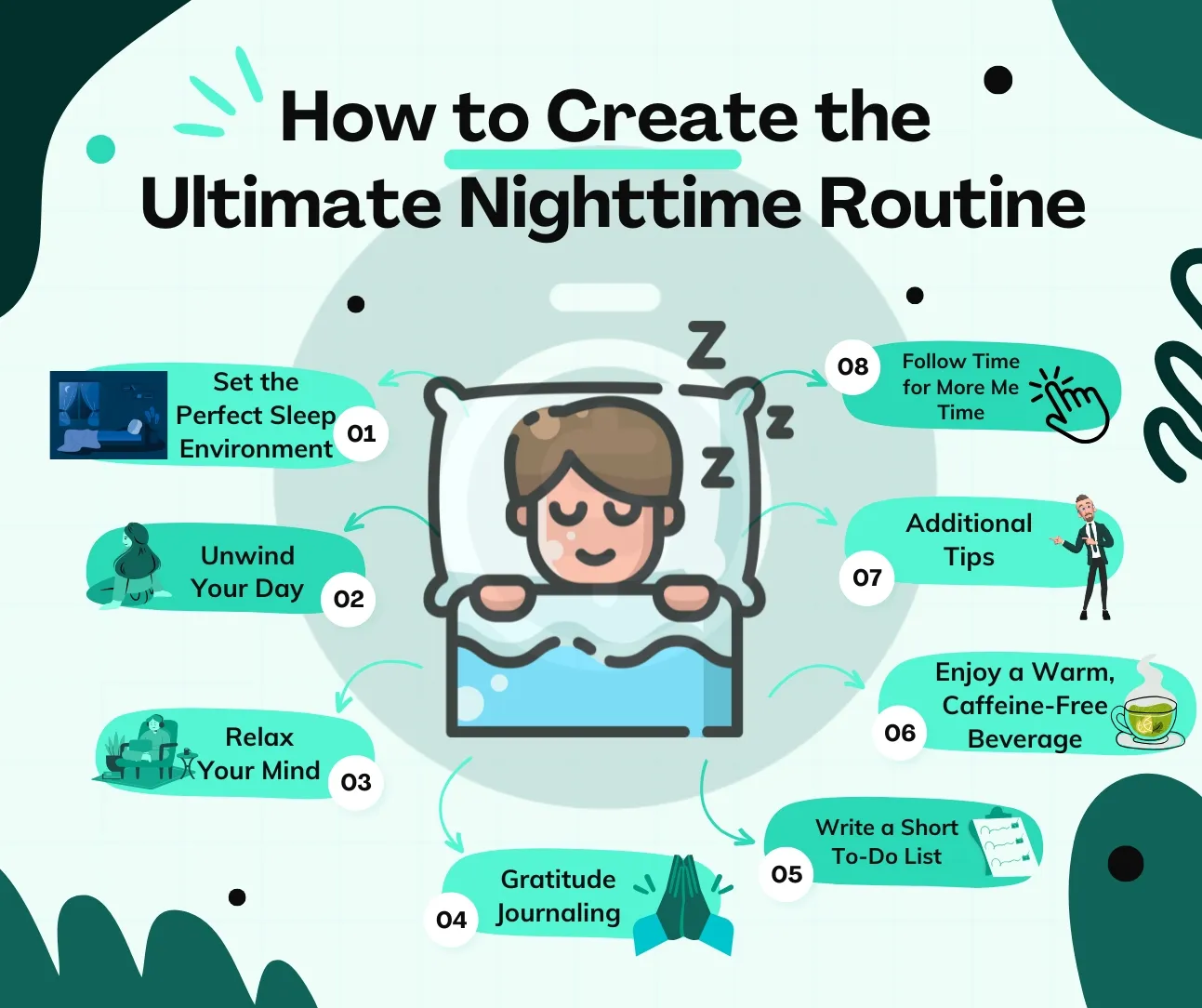
If you’re broke as hell, you’ll have to work twice as hard to escape poverty—that’s how I lived for quite some time. Just imagine how much time I spent working and studying to get to where I am now. It wasn’t fun, and honestly, the only reason I’m still standing today is because of my impeccable night routine, which elevated my sleeping habits.
I’ve perfected my night routine so well that, at first, my team—the people working on this site—found it annoying when they tried to contact me in the middle of the night with reports or questions—most of them are night owls after all. Eventually, they got used to it. They know that even though I say they can reach out anytime, there’s a fat chance they’ll get a response during my sleeping hours.
Of course, I know how ironic this sounds coming from a healthcare professional. While I make it a rule to be unavailable at night, I’m always ready to wake up for emergencies—when the hospital calls for all hands on deck, I show up.
Anyway, I spent years refining my night routine because I had to. I know firsthand how sleep deprivation leads to illness, and I can’t afford to waste money on hospital visits. Trust me, I know how expensive they can be.
Beyond keeping me healthy, a solid night routine is a game-changer for productivity. It saves me time, streamlines my tasks, and boosts efficiency—all crucial for maximizing earning potential and staying on top of my finances.
So, I’m going to share my night routine with you. Hopefully, you’ll find it useful and put it into practice. Let’s get started!
1. Set The Perfect Sleep Environment With Simple Steps
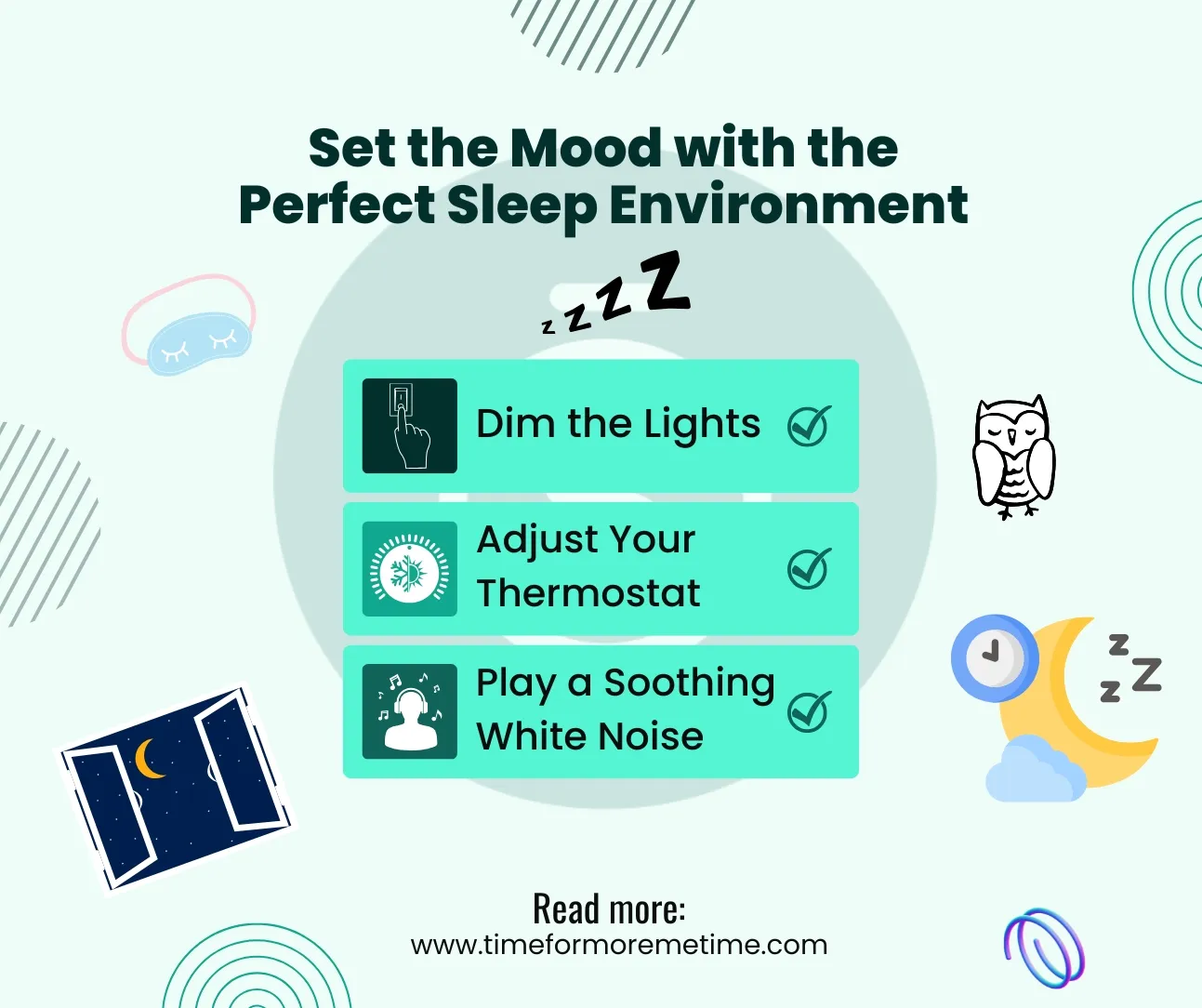
Have you ever walked into a spa and instantly felt at ease? That’s no accident. The calming scents, soft lighting, and soothing music are all carefully designed to create a relaxing atmosphere. Spa owners know that setting the right mood helps their clients unwind and enjoy the experience.
Your bedroom should work the same way. If you stepped into my room, the first thing you’d want to do is sleep. That’s because I’ve designed it to be as peaceful and sleep-inducing as possible. A serene environment sets the stage for better rest and overall well-being. If you do it right, your sleep could improve.
So, what are the steps you can include in your nighttime routine to make sure you have the perfect sleep setup? Here they are:
Dim the lights: Your body responds to light cues. Exposure to bright light before bed reduces melatonin—the hormone that regulates sleep. To improve my sleep quality, I start dimming the lights about an hour before bedtime, signaling to my body that it’s time to wind down.
Adjust your thermostat: Research suggests that a cool room, ideally around 65–68°F (18–20°C), promotes better sleep. Experiment with different temperatures to find what feels most comfortable for you.
Play white noise: Noisy neighbors? Traffic sounds? A white noise machine or even a simple fan can drown out distractions and signal to your brain that it’s time to sleep.
These steps are easy to implement, and they make a huge difference. And this is the first step on the ways to create a bedtime routine for you.
Of course, there are plenty of other ways to enhance your sleep environment outside your night routine, so don’t be afraid to experiment and find what works best for you!
2. Unwind Your Day Through Soothing Rituals
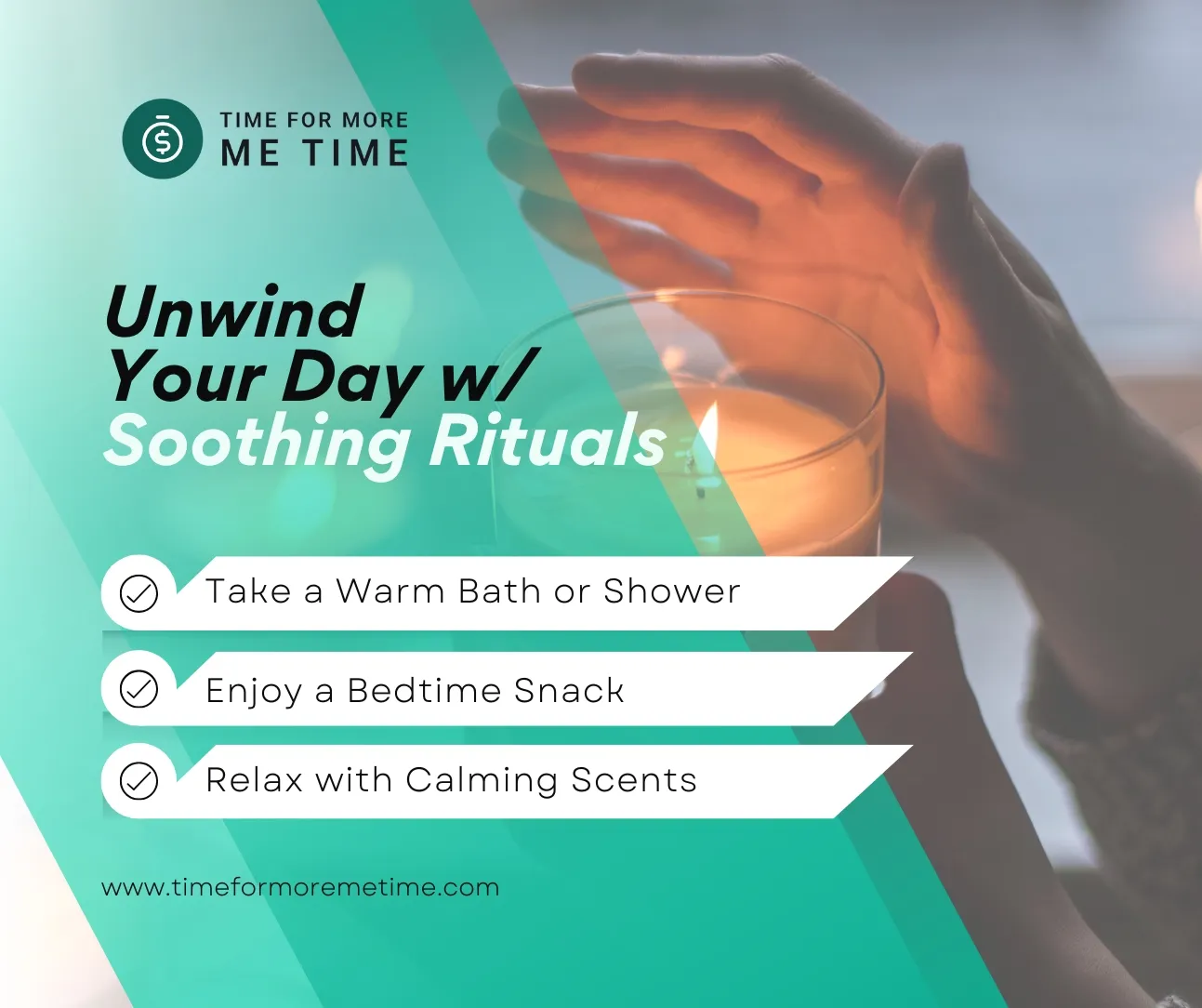
Once your sleep environment is set, the next step in your night routine is unwinding and letting go of the day’s stress. This is the part you should look forward to—the goal here is to make body feel good before you start sleeping.
So, what can you do to unwind? Here are a few simple but effective options:
Take a warm bath or shower: This isn’t just an old wives’ tale. Research shows that taking a warm shower or bath an hour or two before bed can improve sleep. The drop in body temperature afterward mimics your body’s natural cooling process as it prepares for rest. As a bonus, you’ll wake up feeling fresh and ready to go without worrying about showering in the morning.
Enjoy a bedtime snack: If you tend to wake up hungry at night, a small, sleep-friendly snack can help. Opt for something with protein and complex carbs, like a small bowl of oatmeal or a banana with nut butter. But keep it to a minimum—while it’s tempting, late-night snacking isn’t the healthiest habit!
Relax with calming scents: Essential oils like lavender and chamomile can help relax your mind and promote a sense of calm. Try using a diffuser, adding a few drops to your pillow, or lighting a scented candle. If candles aren’t your thing, consider an ionizer with essential oils for a similar effect.
Integrating this into your nighttime ritual ensures that your body is relaxed before bed. As a result, you’ll wake up feeling well-rested and energized to take on the day.
3. Relax Your Mind With Calming Activities
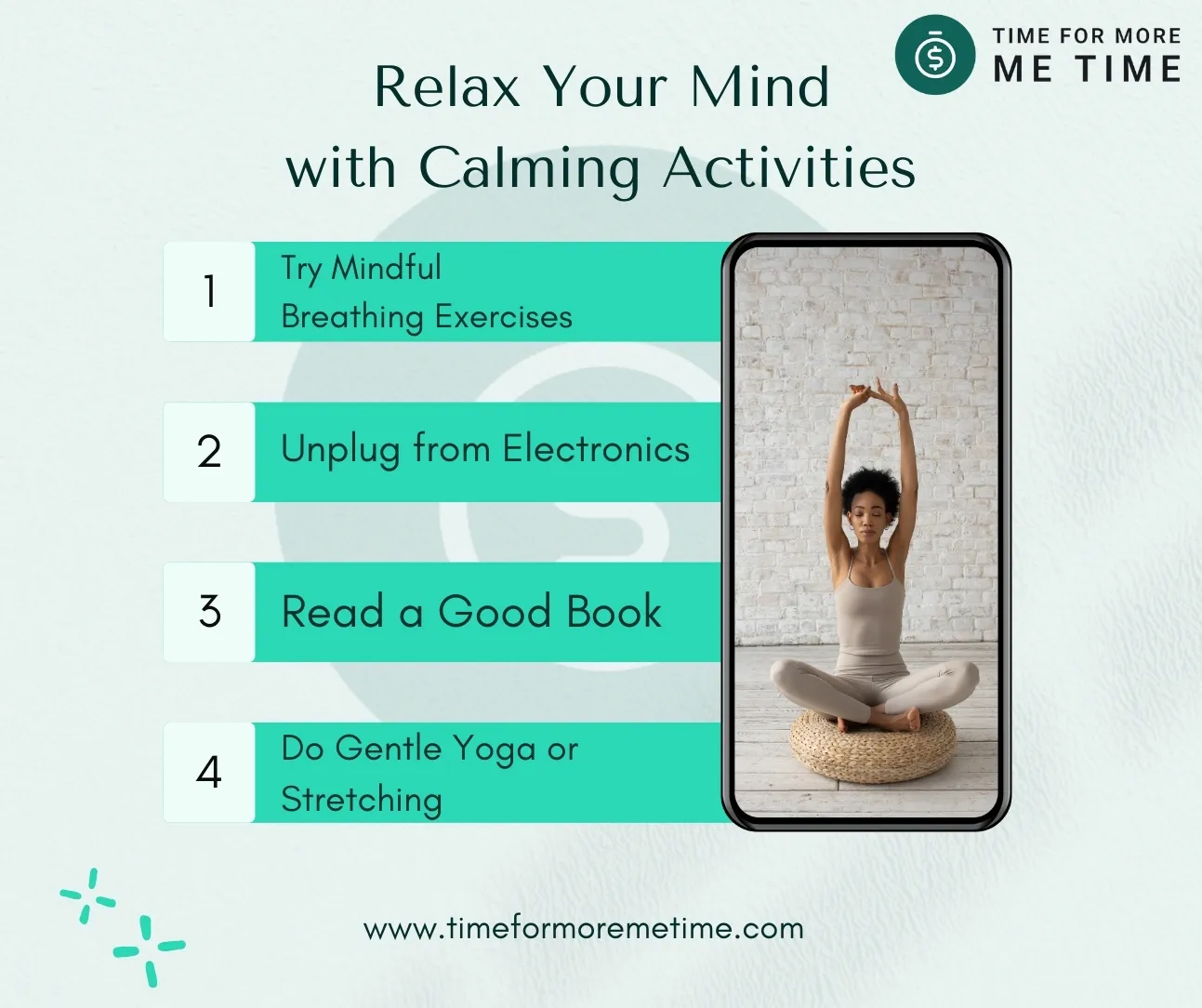
You’ve loosened up your body—now it’s time to relax your mind. After all, to truly unwind at the end of the day, you need to engage in activities that help quiet your thoughts and ease stress.
There are plenty of ways to do this, but what works for one person might not work for another. It’s all about finding what helps you unwind best. The key is to establish calming practices that help you let go of the day’s stress. Here are a few things I include in my night routine to relax my mind:
Doing mindful breathing exercises: A few minutes of deep breathing can do wonders for calming your nervous system and silencing racing thoughts. Get apps that offer guided meditations to help yourself get started.
Unplugging from electronics: This one’s tough but essential. If you find yourself endlessly scrolling through social media before bed, try setting a “bedtime” for your phone. Instead, opt for screen-free activities that help you wind down. Reducing blue light exposure before bed can prevent it from disrupting your sleep cycle.
Read a good book: Swap the bright screen for the pages of a physical book. Choose something engaging but not overly stimulating, and let the story help you relax without the interference of blue light.
Do gentle yoga or stretching: Just a few minutes of light stretching before bed can help release physical tension and promote relaxation. Health professionals often recommend this as a simple way to ease stress.- Play a soothing playlist: Music can be a great way to calm the mind, but choose soft, slow tunes. While your favorite rock or metal tracks might be great during the day, they’re not ideal for winding down. Create a playlist with relaxing melodies to set the right mood for sleep.
By incorporating these relaxation techniques into your nighttime routine, you’ll set the stage for a restful, refreshing sleep.
4. Uplift Yourself Through Gratitude Journaling
Once your body and mind are relaxed, it’s time to nourish your spirit. One of the best ways to do this is through gratitude journaling. Incorporating it into your bedtime routine can have a positive impact on your mindset and overall well-being.
I do this every other day, and it genuinely makes me feel good about the things I’ve accomplished. I take my time—sometimes up to 30 minutes—because I like to list everything I did well that day.
If you’re new to this, I encourage you to start journaling daily. It doesn’t have to take long—just spend a few minutes each evening writing down things you’re grateful for, no matter how small. Over time, expressing gratitude will become second nature, and your reflections may naturally deepen.
By focusing on gratitude, you shift your attention away from stress and worries, giving yourself the opportunity to fall asleep with a lighter heart and reduced anxiety. Recognizing the good in your life can lead to an improved mood, increased resilience, and a greater sense of peace as you drift off to sleep.
5. Write To-Do List For Tomorrow
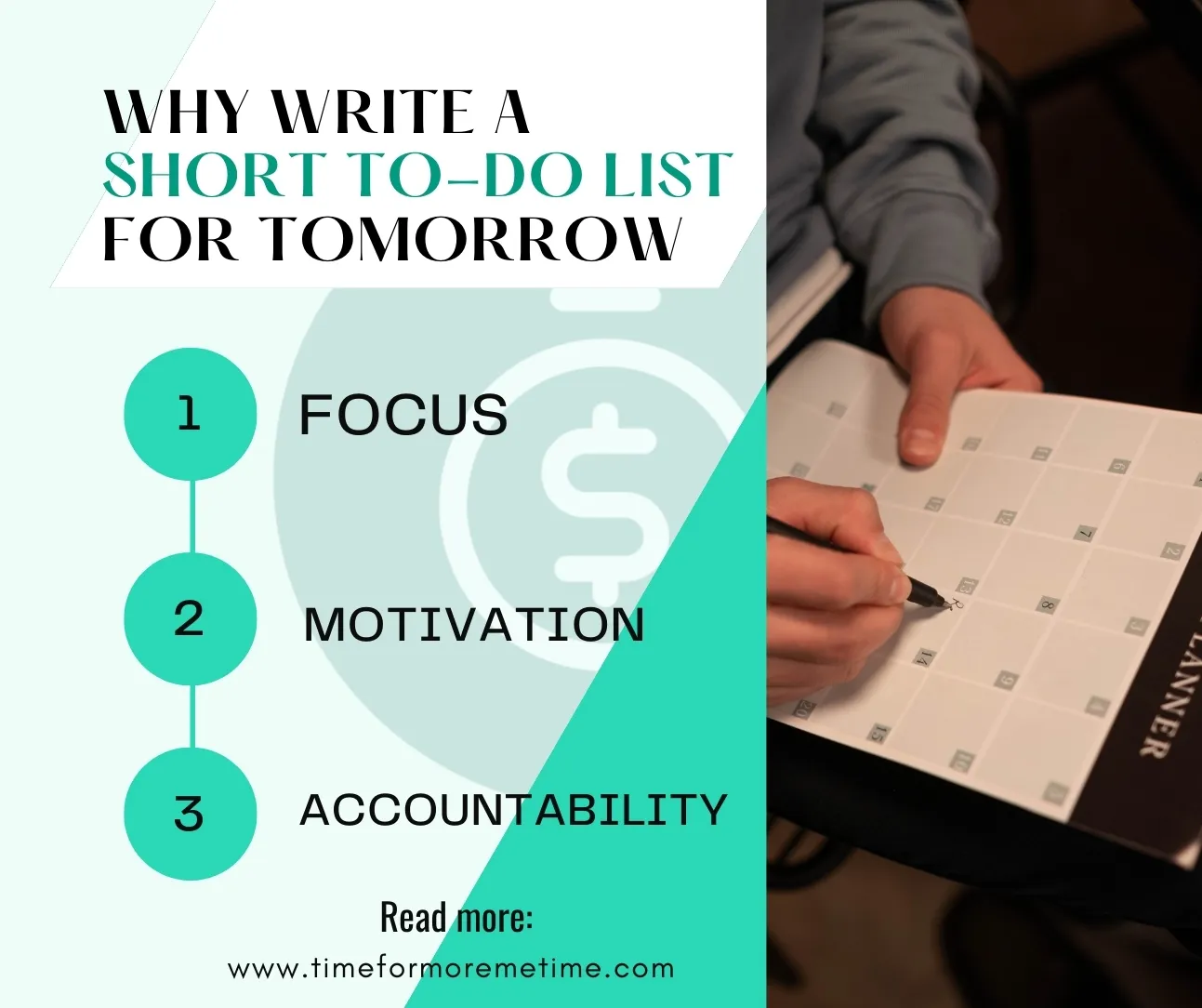
After journaling your gratitude, take a moment to write down your goals for tomorrow. If you want to make more money, save time, or simply stay productive, this is a key ingredient for a solid nighttime routine.
This step doesn’t have to be complicated. Think of it as closing up shop for the day, even if you work from home. By doing this, you set yourself up for a smoother morning, allowing you to wake up with clarity and purpose.
Why does this work? When you write down your goals, your brain starts processing them, almost like a mental rehearsal for the next day. This reduces morning stress and helps you jump straight into your success habits with a clear plan.
Here’s some additional reasons why a goal list is powerful:
- Focus: It’s easy to get sidetracked. A list keeps you focused on what matters most.
- Motivation: Seeing your goals written down gives you an extra push to accomplish them.
- Accountability: Writing them down feels like a commitment, making you more likely to follow through.
Keep it simple—jot down three to five things you want to achieve the next day. They don’t have to be big; what matters is that you have a plan. Whether you use a pen and paper or a to-do list app, the key is to write them down!
6. Enjoy A Caffeine-Free Beverage
Sometimes, we just crave something warm before bed—I know I do. Maybe it stems from childhood, hearing friends talk about their nightly warm milk while I never had that luxury.
A warm, caffeine-free drink before bedtime is a great addition to your nighttime routine. You’re already making time for yourself and focusing on relaxation, so why not enhance it with a soothing drink?
Herbal teas are a fantastic option. There are plenty of blends to choose from, but some of the best for sleep include chamomile, lavender, and valerian root. These herbs have natural calming properties that help you unwind. Plus, the simple act of slowly sipping a warm drink can be soothing in itself.
If tea isn’t your thing, warm milk is another great choice. Milk contains tryptophan, which helps your body produce sleep-regulating hormones like serotonin and melatonin.
Just remember, the key is to avoid caffeine—even hours before bed, it can still interfere with your sleep. Also, keep your intake in check, especially if you tend to wake up in the middle of the night to use the bathroom. If that’s the case, try having your warm drink earlier in your night routine.
7. Additional Tips For A Successful Bedtime Routine

Yes, I do a lot before bed—but that doesn’t mean I do everything all the time! I mix and match activities depending on my mood, but the ones I’ve shared earlier are my non-negotiables.
If you want to stay consistent with your nighttime routine, here are a few key tips for establishing a nighttime routine:
- Be consistent: Once you’ve found the activities that work for your ideal nighttime routine, stick with them as much as possible—even on weekends. A regular sleep-wake cycle maximizes the benefits of quality rest.
- Adjust as needed: If something isn’t working, change it. This routine is about you, so experiment and refine until you find what brings you the best sleep.
- Involve your pets: It’s not just us who benefit from routines! Studies show that most people see their pets as family and prioritize their comfort. Consider incorporating a calming pre-bed ritual for your furry friends—whether it’s gentle brushing, light playtime, or a few minutes of cuddle time.
With these tips for better sleep hygiene and night routine, you’ll set yourself up for a restful night and wake up ready to take on the day!
FAQs
I may not have covered everything that’s on your mind about nighttime routines, so here’s my go-to FAQ section to clear things up!
Why is a nighttime routine important?
Ever wondered how to maintain a healthy sleep schedule? The key is a solid nighttime routine. A well-structured night routine improves sleep quality, boosts productivity, and enhances overall well-being. It’s one of the foundations of good sleep hygiene. If you want to wake up refreshed and ready to tackle the day, establishing a consistent nighttime routine is a game-changer.
By the way, I’ve mentioned sleep hygiene a few times—so what is sleep hygiene? Sleep hygiene refers to the habits and practices that promote high-quality sleep and overall health. It includes your nighttime routine, as well as behaviors and environmental factors that regulate your sleep cycle and improve the restfulness of your sleep.
How long should my nighttime routine be?
Personally, my routine takes almost an hour because I want to make the most of my time for myself. With two jobs, I need to prioritize self-care and ensure I get the best sleep possible. That way, I wake up fully recharged and ready to take on my morning routine.
That said, your routine doesn’t have to be that long. Ideally, 30 minutes to an hour is enough to wind down and prepare for sleep. But ultimately, the length of your nighttime routine depends on your schedule and what works best for you.
What if I don’t have time for a full routine?
There are days when I come home exhausted, and the moment I hit the couch or bed, I’m out like a light. It happens. So, I get it; sometimes, we can’t get into our routine despite it being too important for us.
When I don’t have time for my full routine, I make sure to do at least one key habit before even getting close to my bed. If you’re short on time, a quick 10–15 minute routine can still make a difference. Just focus on habits that relax you and set you up for a smoother next day.
Conclusion
Incorporating a well-structured nighttime routine and doing the sleep hygiene tips I mentioned here can significantly boost your productivity and overall well-being. With a solid night routine, you’ll stop waking up groggy and tired—you’ll wake up energized and ready to seize the day!
Now that you have these tips to create your ultimate routines in the night, why not start now? Take that first step toward better sleep and greater productivity—your future self will thank you!
For more valuable tips on finance and time-saving strategies, subscribe to our site or YouTube channel! Join me in building a supportive community dedicated to making the most of our time and achieving financial freedom.






